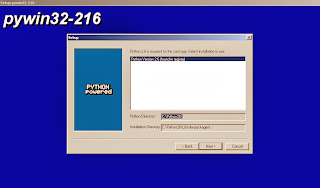Python is quite known and appreciated.
Today I saw an article "What's your favorite programming language?" LinuxWeek proncetaj of a 26% (1074 votes) ...
In python "module" which is actually a library.
Using it is simple: import "module name"
See example below:
import os
There are many modules in the Python language.
For example I chose an example of how to display modules that are installed. Open the python command line and run the examples below:
C:\Python32>python
Python 3.2 (r32:88445, Feb 20 2011, 21:29:02) [MSC v.1500 32 bit (Intel)] on win32
Type "help", "copyright", "credits" or "license" for more information.
>>> help('modules')
Please wait a moment while I gather a list of all available modules...
__future__ audioop imp shlex
_abcoll base64 importlib shutil
_ast bdb inspect signal
_bisect binascii io site
_codecs binhex itertools smtpd
_codecs_cn bisect json smtplib
_codecs_hk builtins keyword sndhdr
_codecs_iso2022 bz2 lib2to3 socket
_codecs_jp cProfile linecache socketserver
_codecs_kr calendar locale sqlite3
_codecs_tw cgi logging sre_compile
_collections cgitb macpath sre_constants
_compat_pickle chunk macurl2path sre_parse
_csv cmath mailbox ssl
_ctypes cmd mailcap stat
_ctypes_test code marshal string
_datetime codecs math stringprep
_dummy_thread codeop mimetypes struct
_elementtree collections mmap subprocess
_functools colorsys modulefinder sunau
_hashlib compileall msilib symbol
_heapq concurrent msvcrt symtable
_io configparser multiprocessing sys
_json contextlib netrc sysconfig
_locale copy nntplib tabnanny
_lsprof copyreg nt tarfile
_markupbase csv ntpath telnetlib
_md5 ctypes nturl2path tempfile
_msi curses numbers test
_multibytecodec datetime opcode textwrap
_multiprocessing dbm operator this
_pickle decimal optparse threading
_pyio difflib os time
_random dis os2emxpath timeit
_sha1 distutils parser tkinter
_sha256 doctest pdb token
_sha512 dummy_threading pickle tokenize
_socket email pickletools trace
_sqlite3 encodings pipes traceback
_sre errno pkgutil tty
_ssl filecmp platform turtle
_string fileinput plistlib turtledemo
_strptime fnmatch poplib types
_struct formatter posixpath unicodedata
_subprocess fractions pprint unittest
_symtable ftplib profile urllib
_testcapi functools pstats uu
_thread gc pty uuid
_threading_local gdata py_compile warnings
_tkinter genericpath pyclbr wave
_warnings getopt pydoc weakref
_weakref getpass pydoc_data webbrowser
_weakrefset gettext pyexpat winreg
abc glob queue winsound
aifc gzip quopri wsgiref
antigravity hashlib random xdrlib
argparse heapq re xml
array hmac reprlib xmlrpc
ast html rlcompleter xxsubtype
asynchat http runpy zipfile
asyncore idlelib sched zipimport
atexit imaplib select zlib
atom imghdr shelve
Enter any module name to get more help. Or, type "modules spam" to search
for modules whose descriptions contain the word "spam".
>>> dir('module')
['__add__', '__class__', '__contains__', '__delattr__', '__doc__', '__eq__', '__
format__', '__ge__', '__getattribute__', '__getitem__', '__getnewargs__', '__gt_
_', '__hash__', '__init__', '__iter__', '__le__', '__len__', '__lt__', '__mod__'
, '__mul__', '__ne__', '__new__', '__reduce__', '__reduce_ex__', '__repr__', '__
rmod__', '__rmul__', '__setattr__', '__sizeof__', '__str__', '__subclasshook__',
'capitalize', 'center', 'count', 'encode', 'endswith', 'expandtabs', 'find', 'f
ormat', 'format_map', 'index', 'isalnum', 'isalpha', 'isdecimal', 'isdigit', 'is
identifier', 'islower', 'isnumeric', 'isprintable', 'isspace', 'istitle', 'isupp
er', 'join', 'ljust', 'lower', 'lstrip', 'maketrans', 'partition', 'replace', 'r
find', 'rindex', 'rjust', 'rpartition', 'rsplit', 'rstrip', 'split', 'splitlines
', 'startswith', 'strip', 'swapcase', 'title', 'translate', 'upper', 'zfill']
>>> exit()
This is just another example of how to use python.

